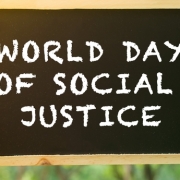The Mirage Of Social Justice, Part 3: Primitive Thinking By Immature Minds: “Social Justice” Is Based On Envy, The Most Anti-Social Of All Passions.
“Social” justice will not permit individual freedom. Social justice warriors observe that the results of the spontaneous order of the market are not distributed equally. “Someone” must be to blame. Therefore, they must be punished. Their property must be involuntarily transferred to others.
To Hayek, this is primitive thinking by immature minds. Why? Because they can not comprehend the impersonal process of the market – one which brings about a greater satisfaction of human desires than any deliberate human organization could achieve. Instead, they “anthropomorphize” or “personalize” the market – they think of it as the deliberate acts of some individuals who are “in charge”, and must be brought to heel.
Social Justice Will Lead Straight To Socialism.
This conception of “social justice” says Hayek, leads straight to full-fledged socialism. It requires a social organization to assign particular shares of the product of the economic system to particular individuals or groups. It assumes the moral duty to create a power that can achieve an approved pattern of distribution.
Social justice is the most widely used and most effective argument in politics. Every claim for government action on behalf of particular groups is advanced in its name. Opposition is weakened when social justice is invoked. This is so much the case that socialists have abandoned the government ownership of the means of production as their preferred redistribution vehicle, and substituted heavy taxation based on the promise of social justice.
This represents a complete revolution in social order: from a society based on principles of just individual conduct to a society based on government satisfying the demand for social justice, and placing the duty on authorities with the power to command people what to do. Worse, government authority is supplemented and reinforced by other social groups such as the church. Social justice has become a quasi-religious superstition. But, like the superstitious belief in witches and ghosts in earlier historical times, near universal acceptance does not prove validity.
Social Justice Overturns American Values.
Society will become fundamentally different if we succumb to the superstitions of the social justice warriors. We will be forced to abandon individual responsibility, self-reliance, and traditional moral values, and replace these principles with dependence, collectivism and the high time preference of instant gratification.
We will not be able to preserve the benefits of free markets if we impose the requirements of social justice. There will be self-accelerating decline. A dependent group insists on more government action to achieve distributive justice; the government discovers that to achieve the desired outcome, groups must be subject to more and more government control, and the system progressively approaches totalitarianism.
Social Justice Requires Central Control.
If we maintain a system in which everyone is free to choose their occupation, there can be no control over whether or not the results will correspond to the wishes of the social justice warriors. Social justice can only be realized in a centrally controlled system that limits free choices and free action of individuals. Justice can only refer to the way free competition is carried on, not to its results. And we could never decide on the remuneration “deserved” by different activities. When we ask what ought to be the relative remunerations of a nurse or a butcher or a coal miner or a judge, or a deep sea diver or a cleaner of sewers, or the creator of a new industry or computer programmer or a jockey or the jet pilot or the professor, the appeal to social justice does not give us the slightest help in deciding. It must be left to the market.
The word “social” implies that “society” ought to hold itself responsible for the particular material position of all its members and for assuring that each receives what is “due” to them. This implies that “society” has a conscious mind that can be guided by these principles. Ultimately, social justice implies some kind of equality in earnings, and the use of government power to move in the direction of material equality. This is fatal because, to achieve equal outcomes, government can not treat everyone equally. It must tell people what to do, and must take on the arbitrary power to do so. A claim for equality of material position can be granted only by a government with totalitarian powers.
Anyone who is assured remuneration according to some principle that is accepted as constituting “social justice” can not be allowed to decide what he or she is to do. They can’t be allowed to find another occupation or profession; they must stick to the occupation they are assigned for the remuneration assured to them. This is not a system of individual freedom. The rules of social justice are those of the conduct of superiors to their subordinates. The citizens must be subordinate to authority.
We Have No Moral Entitlement To Stable Results From The Market.
Another belief of the social justice warriors is the supposed “social injustice” of losing an economic position that they have been accustomed to. Coal mines and steel mills close, employers downsize or go out of business or move production to another place. There is a “strong and almost universal belief that it is unjust to disappoint legitimate expectations of wealth.” We all prefer that no very great changes will be made to our condition. These changes may look like undeserved strokes of misfortune but they are an indispensable part of the steering mechanism of the market. Negative feedback is the most important data keeping the market dynamic. Constant adaptation to changing circumstances is critical in directing effort to the highest and best use. We have no moral entitlement to stable results from the market. If we were to protect individuals from these market changes, then there would be stasis, and no-one could ever be upwardly mobile or successful.
In the end, the gospel of “social justice” preaches the sordid sentiment of dislike of people who are better off than oneself, or simply envy, the “most anti-social of all passions”. It has nothing to do with justice.







